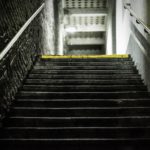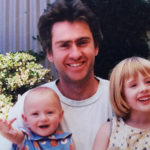Why Be Happy When You Could Be Normal? is the tenth novel of British Author, Jeanette Winterson. In it she returns to the childhood depicted in her first award-winning book, Oranges Aren’t The Only Fruit. Although this time around Winterson ditches the “semi autobiographical” label of Oranges and embraces the memoir. Winterson regards the first book as “a story I could live with. The other one was too painful. I could not survive it.” Now she has the courage to return and offers the “silent twin” giving details of the bleakness of her childhood.
Adopted at six weeks of age to an overbearing, religious zealot of a woman clearly suffering from some pretty serious mental health issues,
“She was a flamboyant depressive; a woman who kept a revolver in the duster drawer, and the bullets in a tin of Pledge. A woman who stayed up all night baking cakes to avoid sleeping in the same bed as my father. A woman with a prolapse, a thyroid condition, an enlarged heart, an ulcerated leg that never healed, and two sets of false teeth – matt for everyday, and a pearlised set for ‘best’.”
Winterson’s childhood is peppered with cruelty. Beatings, being locked out of the house and left on the doorstep overnight, being locked in the coal-hole, stinging criticisms “the Devil led us to the wrong crib” this is the world in which the young Winterson struggles to survive.
Winterson escapes the darkness of her reality through books, setting herself the herculean task of reading through the entire English Literature in Prose A-Z section of The Accrington Public Library. Her dedication to the task and adherence to the alphabetical order is serious exercise in commitment.
The book diverts at times to a virtual homage to literature, discussing and quoting some of the greats. While this could be distracting the passion for the works and how these books proved to be a lifeline to the young woman made the diversion worthwhile.
When Winterson watches her mother burn her hidden treasure of books we get an insight how she developed her writing style,
“In the morning there were stray bits of texts all over the yard and in alley. Burnt jigsaws of books. I collected some of the scraps. It is probably why I write as I do – collecting the scraps, uncertain of continuous narrative.”
The book plays with snippets from different moments of a life, almost a stream of conscious, the events unravelling through the eyes of young child, then a confused adolescent and finally a damaged woman.
At sixteen Winterson is kicked out of her dysfunctional home for the crime of falling in love with another girl. When she tells her mother that her girlfriend makes her happy, the woman replies with the line of the title,
“Why be happy when you could be normal?”
It is here we see the strength and resilience of the young writer, and how a helping hand can change the course of a life. At community college the Head of English, Mrs Ratlow, discovers her student’s secret life.
“You are living in a mini and when you are not, in fact, in the Mini you are working on the market to earn money, or you are here at the college, and otherwise you are in the Accrington Public Library reading English Literature in Prose A-Z”.
Mrs Ratlow gives her a spare room to live in and helps her with her Oxford application. The homeless young girl goes on to be a highly successful author. Although, as with everything in life, it is not a simple journey.
The search for happiness, for a sense of belonging, leads Winterson to a nervous breakdown, a suicide attempt and finally a reunion with her birth mother.
It is this final third of the book, where she jumps through the unfeeling bureaucracy to find her birth mother, which I found the most moving. In it Winterson comes to terms with her childhood, she accepts without that childhood she would have not only lived another life but she would have been another person.
There even seems to be some sense of acceptance of her adopted mother.
“Yet I would rather be this me – the me that I have become – than the me I might have become without books, without education, and without all the things that have happened to me along the way, including Mrs W. I think I am lucky.”
Why Be Happy When You Could Be Normal? is powerful and moving, it is a book which rises above the darkness of the subject matter, to offer an insight into how one little girl, in spite of the struggles of her early life and their ongoing legacy on her spirit, managed to claw her way to success and find a life that is both happy and normal.






I don’t know how you could read it, much less how she could live through it – except of course that she had no choice in the matter. She chose such an amazing reading goal! Self-education. No wonder she became a writer. I’m happy she found her voice, and yet my heart breaks for the little child she was.
My children are adopted, and we have such a happy life. And we visit with their birth families. Open adoption is a lovely thing. Happy weekend!
I love that you have such a happy life. You are such an amazing woman. I can see you working hard at making open adoption into a beautiful thing for everybody involved. I really enjoyed this book, I read it for my once-a-month-gig on the ABC Book Club at our local radio station. Others in the club struggled a bit with how sad it was, however, myself and librarian Chris felt it was a story of incredible triumph and she did go on to create a happy life for herself. It’s probably been my favourite read for the year so far. There is some quietly ironic humour in it, particularly in her descriptions of her mother.
Wow. This sounds like a very powerful book. I wonder did writing it help her to deal with the pain? She must be an incredible person.
I think she had probably dealt with the pain before she started the book. There is a great interview with her on Iview at the moment –
Jennifer Byrne Presents Episode 7 Jeanette Winterson
http://www.abc.net.au/iview/#/program/24695
Probably only available in Australia though.
It will be up there for 25 days.